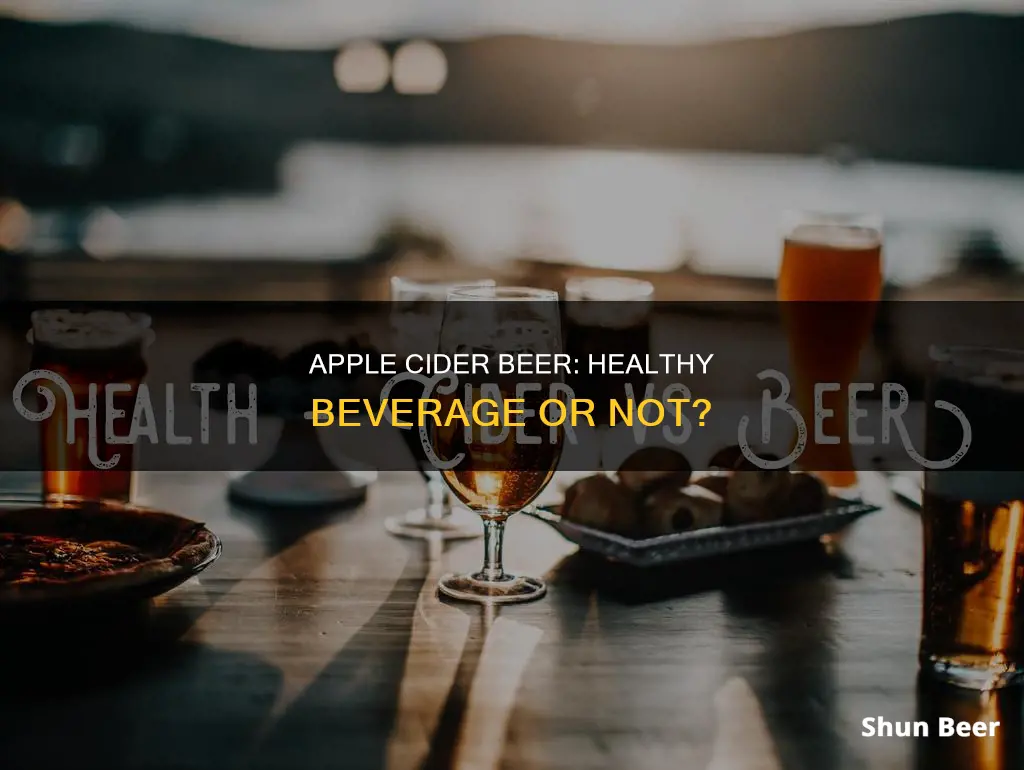
Alcoholic drinks are rarely thought of as healthy beverages, but some research indicates that drinking certain types of cider and beer can minimise the impacts of booze on the body. Cider is made by fermenting fruit with sugar and yeast, and apples are the fruit most commonly used. Apples contain antioxidants like vitamin C, and cider also has anti-inflammatory agents, like anthocyanins, which can help to fight conditions like heart disease and diabetes. Beer is made with yeast, hops, water, and cereals, and is rich in vitamins, minerals, and antioxidants, including flavonoids. Both drinks are calorie-rich and high in carbs, so it's important to consume them in moderation.
What You'll Learn

Apple cider has more antioxidants than beer
Apple cider and beer are not the first drinks that come to mind when someone talks about healthy beverages. However, some research does indicate that drinking the right types of cider and beer does minimise the impacts of booze on the body.
Apple cider contains polyphenols, which are compounds in plants that act as antioxidants. They can help the body fight against free radicals and cell damage, lowering your risk of certain types of cancer, diabetes, and heart disease. Polyphenols also help to ease inflammation in the body.
Beer also contains antioxidants, most prominently flavonoids. However, during the beer-making process, brewers often remove naturally occurring polyphenols to prevent cloudiness. This usually decreases the total polyphenol content, and it is why astringency is noticeably absent from beer.
In conclusion, apple cider has more antioxidants than beer.
Bitter Beers: Health Benefits or Just a Fad?
You may want to see also

Apple cider is gluten-free, beer usually isn't
Apple cider and beer are both alcoholic beverages with distinct production processes and ingredients. While beer is traditionally made with barley, hops, yeast, and sometimes wheat, cider is typically produced by fermenting apple juice with sugar and yeast. These differences have implications for individuals with gluten sensitivities or allergies, as gluten is a protein found in wheat, rye, and barley.
Apple cider is inherently gluten-free. The fermentation process for cider typically uses gluten-free yeast, and apples are naturally gluten-free. Therefore, cider is a suitable option for those who follow a gluten-free diet or have celiac disease. However, it is important to be cautious and read labels, as some ciders may include additives or flavourings that contain gluten. Additionally, cross-contamination can occur if cider is processed or bottled using equipment also used for gluten-containing beverages.
On the other hand, beer usually contains gluten due to the presence of wheat, rye, or barley in its ingredients. For individuals with gluten sensitivities or allergies, including those with celiac disease, consuming gluten can trigger adverse reactions. While some breweries offer gluten-free or gluten-reduced beers, these options may still contain trace amounts of gluten and are not recommended for those with celiac disease.
In summary, apple cider is a gluten-free beverage, making it a good alternative for those who cannot consume gluten. Beer, on the other hand, typically contains gluten, and while gluten-free options exist, they may not be suitable for all gluten-sensitive individuals. Therefore, when considering the health aspects of these beverages, it is crucial to take into account any gluten sensitivities or allergies and choose drinks that align with individual dietary needs and restrictions.
Moscow Mule vs Beer: Which Cocktail is Healthier?
You may want to see also

Apple cider has more sugar than beer
Apple cider and beer are not the first drinks that come to mind when considering healthy beverage options. However, drinking either in moderation can minimise the impacts of alcohol on the body.
Apple cider is made by fermenting apples with sugar and yeast. Apples contain antioxidants like vitamin C, and polyphenols, which are compounds in plants that act as antioxidants. These polyphenols can help the body fight against free radicals and cell damage, lowering your risk of certain types of cancer, diabetes, and heart disease. Polyphenols also help to ease inflammation in the body.
Beer is made with yeast, hops, water, and cereals. It contains a variety of vitamins, minerals, and antioxidants, including calcium. Beer also contains antioxidants, most prominently flavonoids, which are a type of polyphenol compound.
One major difference between beer and apple cider is the amount of sugar in each. Beer is sugar-free, although brewers may add small amounts of sugar to balance sourness. Apple cider, on the other hand, can be quite high in sugar because apples naturally contain a lot of it. The sugar content of apple cider varies depending on the fermentation process. Sweeter ciders are slowly fermented, and the yeast consumes less of the cider's natural sugars. This results in a drink that is sweeter and has a lower alcohol content.
Dry ciders, on the other hand, allow the yeast to consume more of the cider's natural sugars, resulting in a less sweet drink with a higher alcohol content. Commercial ciders often add extra sugar to appeal to consumers who prefer sweeter drinks.
In summary, apple cider has more sugar than beer due to the natural sugar content of apples. The amount of sugar in apple cider can vary depending on the fermentation process and whether commercial producers add extra sugar.
Beer for Hair: Healthy Shine or Foamy Disaster?
You may want to see also

Apple cider has more calories than beer
Apple cider and beer are not typically the first beverages that come to mind when considering healthy drinks. However, some research indicates that drinking these alcoholic drinks in moderation can minimise the impacts of booze on the body.
The average Brit, for example, consumes 3.5 million calories over a lifetime from alcohol alone, according to a study. In a typical month, they will consume eight pints of beer or cider, nine glasses of wine, and three glasses of bubbly, totalling 4,918 calories.
When comparing apple cider and beer, it is important to note that the number of calories in a product depends on the level of alcohol and the amount of sugar or carbohydrates. Apple cider contains, on average, 47 calories per 100ml, while beer contains, on average, 40 calories per 100ml across the most popular brands in the UK. This means that apple cider does generally contain more calories than beer, although this is not always the case.
The higher calorie content in apple cider is largely due to its higher sugar content from its different fermentation process. Cider is made from fermented fruits such as apples, oranges, pears, and peaches, which are naturally high in sugar. Beer, on the other hand, is fermented with low-sugar grains such as hops and barley.
While beer is typically lower in calories than cider, it is important to note that the difference in calorie content between the two drinks is not significant, especially when consumed in moderation. Ultimately, the choice between apple cider and beer depends on personal preferences, as both drinks offer similar health benefits and risks when consumed in moderation.
Stella Beer: Healthy or Not?
You may want to see also

Apple cider can improve your mood
Apple cider has been shown to have a positive impact on mood. While it is not a replacement for seeking professional help for mental health issues, it can be a useful natural supplement to boost your mood.
A study by Arizona State University found that adding apple cider vinegar to the daily diet can improve mood and mental well-being. The study involved 25 healthy college-aged students, half of whom drank an apple cider vinegar drink (two tablespoons of vinegar diluted in one cup of water) twice daily with meals, while the other half took a low-dose vinegar pill. After four weeks, the cider group reported a 20-34% reduction in poor mood, while the placebo group reported a slight increase in poor mood. The urine samples showed that several metabolic alterations associated with vinegar ingestion were consistent with improved mood, including enzymatic dysfunction in the hexosamine pathway and significant increases in glycine, serine, and threonine metabolism.
The compound responsible for the mood-boosting effects of apple cider vinegar is acetic acid. When digested, acetic acid forms the compound acetate, which has been linked to improved cognitive performance in rats. By providing an additional source of acetic acid, drinking vinegar daily could potentially improve mood and cognitive function.
In addition to its effects on mood, apple cider vinegar has a range of other health benefits, including supporting the immune system, improving digestion, lowering blood sugar levels, and contributing to healthy skin and hair.
While the focus here is on apple cider vinegar, it is worth noting that alcoholic apple cider can also improve your mood. Similar to beer, cider can help you relax and release endorphins, lightening your mood and improving your overall well-being. However, it is important to consume alcoholic beverages in moderation, as excessive consumption can lead to negative emotional and physical consequences.
Athletic Beers: Healthy or Just Hype?
You may want to see also
Frequently asked questions
Apple cider beer is not generally considered to be a healthy drink, as it contains empty calories and a significant amount of sugar. However, it does have some potential health benefits, such as being an excellent source of polyphenols, which are compounds that act as antioxidants and help protect the body from inflammation and fight off infections.
In addition to the benefits of the polyphenols, apple cider beer is also a great source of vitamins, minerals, and fibre. The vitamin content may help improve overall health and boost the immune system. Apple cider beer can also help boost energy levels, improve mood, and reduce stress.
Yes, in addition to the high sugar content, apple cider beer is also quite acidic, which can cause stomach upset, indigestion, and tooth decay. It is also not considered a low-calorie drink, with a higher calorie count than beer. Finally, there is a risk of an unpleasant hangover, as some apple cider beers can be quite potent.
Apple cider beer has more calories and carbs than beer, and is generally considered worse for you. Wine is also worse for your waistline, especially if not consumed in moderation. Pure spirits like vodka, rum, whisky, and gin are lower in calories but should be consumed in moderation due to their high alcohol content. Cocktails are the worst option, as they are full of sugar and calories.







